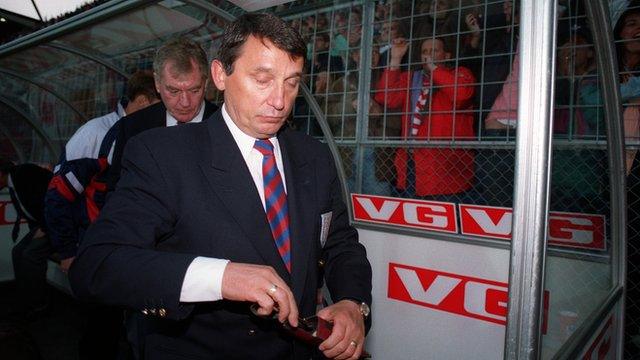Graham Taylor: Ex-England, Watford & Aston Villa manager dies aged 72
- Published
- comments
Obituary: Graham Taylor
Former England manager Graham Taylor has died at the age of 72.
As a club manager, Taylor led Watford from the Fourth Division to runners-up in the old First Division in five years, and to the 1984 FA Cup final.
He took Aston Villa to second in the First Division, returning to Watford and Villa after his spell in charge of the national side, and managing Wolves.
He became England boss in 1990 but resigned in 1993 after the team failed to qualify for the 1994 World Cup.
Taylor later became a renowned pundit for BBC Sport.
A family statement said: "With the greatest sadness, we have to announce that Graham passed away at his home early this morning of a suspected heart attack.
"The family are devastated by this sudden and totally unexpected loss."
Watford will hold a minute's applause in honour of their former manager before their home Premier League game against Middlesbrough on Saturday, and their players will wear black armbands.
The EFL said a minute's applause will be held before this weekend's league fixtures, while clubs will have the option of wearing black armbands.
Tributes have been pouring in, including from musician Sir Elton John, who owned Watford during both of Taylor's spells at the club.
"I am deeply saddened and shocked to hear about Graham's passing. He was like a brother to me," he wrote on Instagram.
"We shared an unbreakable bond since we first met. We went on an incredible journey together and it will stay with me forever.
"He took my beloved Watford from the depths of the lower leagues to uncharted territory and into Europe. We have become a leading English club because of his managerial wisdom and genius."
Remembering Graham Taylor: When Graham met Elton
Aston Villa said they were "deeply saddened" by the news and that Taylor would be "fondly remembered" by staff who worked with him.
"Graham will always have a place of honour in our history books for his achievements while at the helm," the club added.
Football Association chairman Greg Clarke said: "He was a hugely popular and respected figure in the game, not just in English football but international circles as well.
"I know Graham was very proud of his time as England manager and it was always great to see him at football grounds across the country.
"He had an exceptional knowledge and a love for the game that never diminished over the years. He will be much missed by us all at Wembley and St George's Park."
Match of the Day pundit and former England striker Alan Shearer was given his international debut by Taylor.
"I held him in the very, very highest regard because of what he gave to me," he told BBC Sport. "He set me on the road, as it were. I'll never ever forget that."
Graham Taylor: Alan Shearer pays tribute to former England boss
Former Manchester United manager Sir Alex Ferguson told the League Managers' Association website:, external "Graham was one of the old-school managers. He started as a very young man of 28, having suffered a career-ending injury as a player.
"He was the natural choice to become the England manager when he did and this was the pinnacle of a hugely successful career.
"I have very fond memories of Graham. He was approachable, open and honest. If he could help you in any way, he always would."
Howard Wilkinson, chairman of the LMA - of which Taylor was the first president, said: "Football has lost one of its greatest servants and our thoughts and condolences are with his wife Rita, his daughters Joanne and Karen, and the rest of his family."
Much of Taylor's work as a pundit at the BBC was carried out for BBC Radio 5 live, and controller Jonathan Wall said: "His colleagues loved working with him, and for our listeners he was a much-loved pundit. He leaves us with wonderful warm memories and so many stories. Our thoughts are with his family at this sad time."
Taylor started out as a player and, after coming through the youth ranks with Scunthorpe, was a defender at Grimsby and Lincoln City.
He became manager at Lincoln in 1972 aged 28, and led them to the old Fourth Division title in 1975-76 before joining Watford.
In his first spell as Hornets boss between 1977 and 1987, Taylor took the club to the top flight and they finished second to Liverpool in 1983.
He was appointed by Villa in 1987 and, after leading them to promotion into the top tier, took them to second in 1990.
His exploits led to his appointment as England manager, but he had a turbulent spell in charge of the national team as they failed to make it out of the group at Euro 92 and did not qualify for the World Cup in the United States two years later.
Taylor's return to club management came with a brief stint at Wolves before he again took over at Watford, leading them to two promotions in as many years as he guided them back into English football's top flight.
He also returned to manage Villa in 2002 but retired a year later.
His association with Watford continued when he became chairman in 2009, a post he held for three years, and the club renamed their Rous Stand at Vicarage Road after Taylor in 2014.
"In this day and age, when a stand is named after somebody, it's for commercial reasons. I felt honoured," he told BBC Three Counties Radio at the time.
The day Graham Taylor resigned as England boss
Graham Taylor's managerial record
Lincoln City (1972-77) - Youngest person to become an FA coach, at the age of 27. Won Fourth Division title in 1976.
Watford (1977-1987) - Led team from Fourth Division to First Division in five years (W244, D124, L159)
Aston Villa (1987-1990) - Took over when Villa had been relegated to Second Division. Took them back to top flight at his first attempt. Finished runners-up to Liverpool in his third season in charge (W65, D35, L42)
England (1990-1993) - Failed to progress beyond group stage of Euro 92 or qualify for World Cup in 1994 (W18, D13, L7)
Wolves (1994-1995) - Resigned after one full season in charge - (W37, D27, L24)
Watford (1996-2001) - Won Division Two title in 1998 and Division One play-off final in 1999 (W104, D80, L91)
Aston Villa (2002-2003) - Finished 16th in Premier League before retiring (W19, D14, L27)
Analysis
BBC Sport chief football writer Phil McNulty
Graham Taylor will not simply be remembered for his outstanding management at places like Watford and Aston Villa where, despite his struggles with England, he proved himself an outstanding manager.
Taylor will be remembered, by those who had dealings with him in his career as a manager and a BBC Sport pundit, as one of the nicest and most genuine men you could ever meet.
He, in many respects, was vastly underrated as a manager because of his unfulfilling spell with England, but close scrutiny of his record proved his pedigree.
Taylor took Watford from the Fourth Division to second place in the First Division, as well as the 1984 FA Cup final, before the advent of the Premier League. It was a remarkable feat.
He continued at Aston Villa, not only taking them back into the top flight but almost winning the title, finishing second to Liverpool in his third season at the club.
A spell at Wolves did not work out but he reproduced the old magic in a second spell at Watford, taking them into the Premier League, although a second stint at Villa was not so successful.
Above all, this is a loss that will be felt keenly throughout football's generations because the game has lost one its true gentlemen.
Football world pays tribute
Taylor's life in pictures
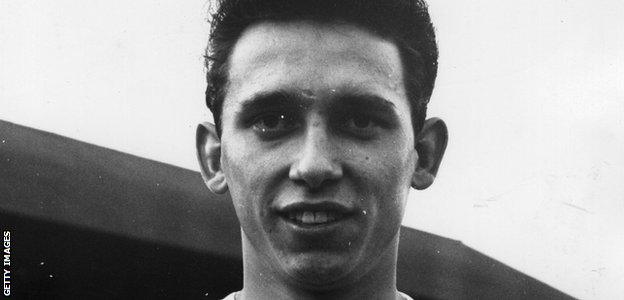
Graham Taylor enjoyed a 10-year playing career with Grimsby and Lincoln between 1962 and 1972
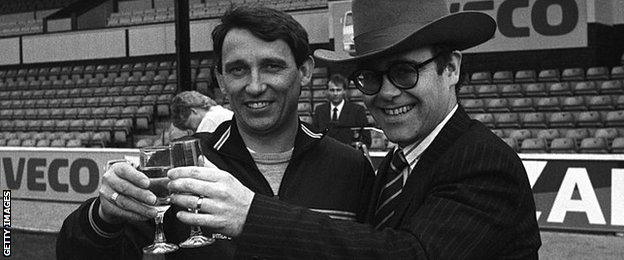
Taylor and pop star Elton John teamed up to take Watford from the bottom division to the top flight
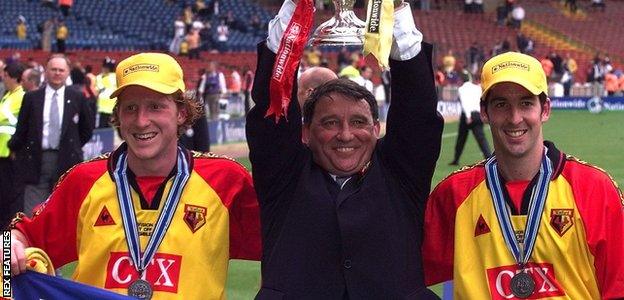
Taylor returned for a second spell as Watford manager in 1996, leading them to the Division Two title and victory in the Division One play-offs (now the Championship)
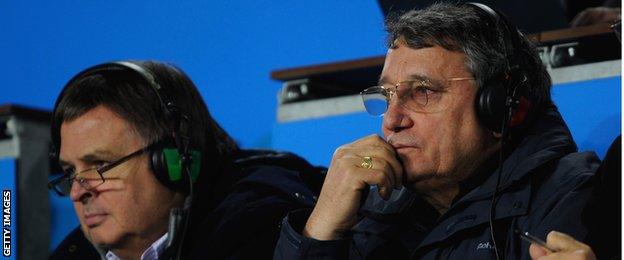
After his retirement from coaching, Taylor (right) worked in the media as a highly respected analyst
- Published12 January 2017
- Published4 January 2017
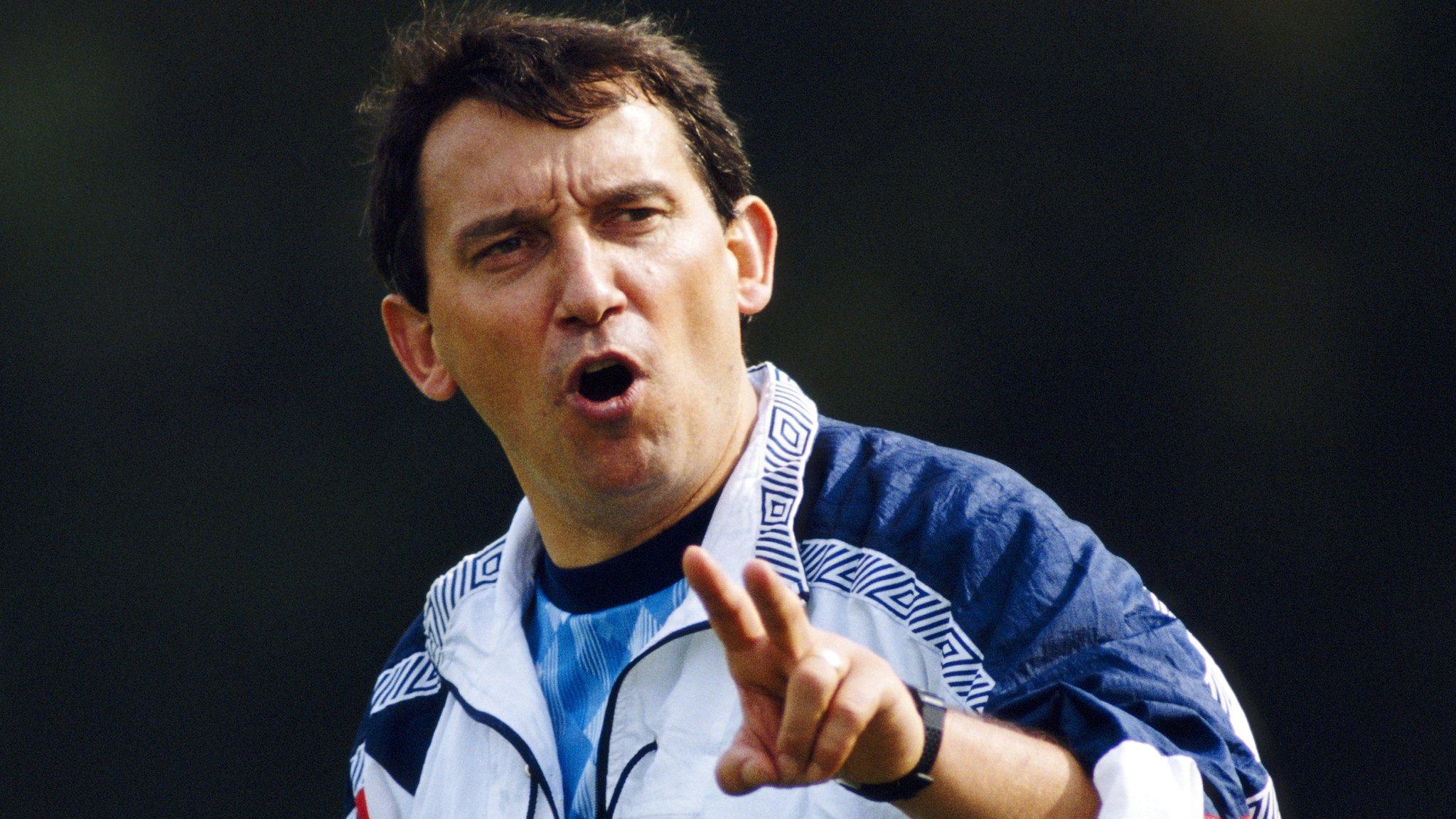
- Published12 January 2017
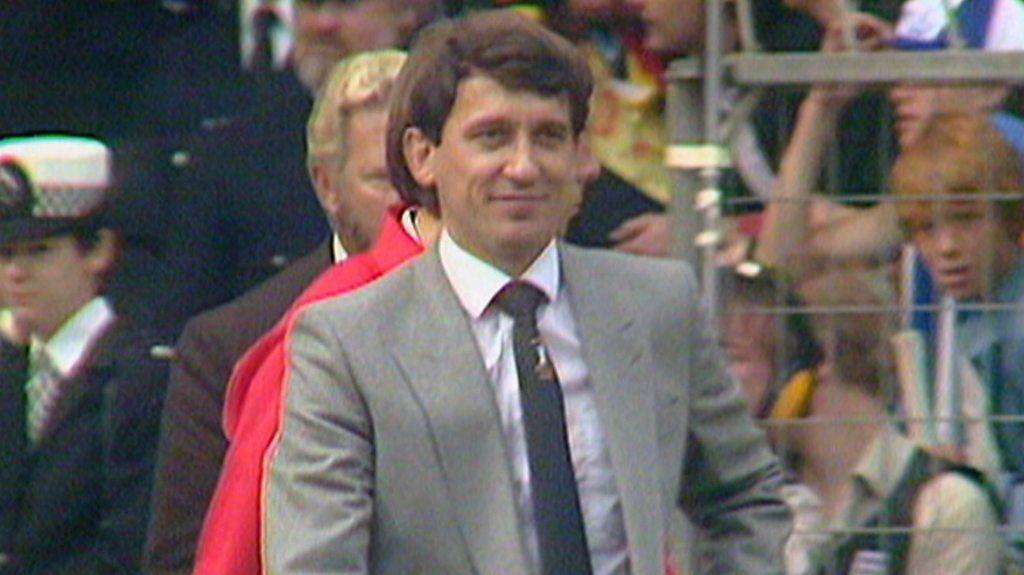
- Published24 November 2013
